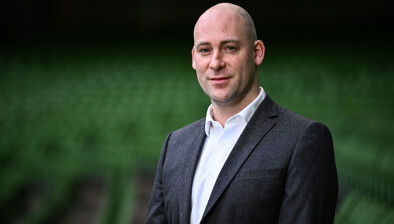Lawyer of the Month: Darren Lalor BL

Darren Lalor BL
Darren Lalor is one of life’s enthusiasts — and that approach certainly extends to his work as a criminal barrister. “It’s a job that enables me to make a real difference to peoples’ lives, people who often have very little and who need committed lawyers to stand up for them,” he says.
Currently though, he feels decidedly less rewarded by the rates of pay for District Court practitioners around Ireland which are, as he trenchantly puts it, “woefully inadequate”.
In fact, Lalor, whose entry into the legal profession was a particularly unconventional one — having worked as a taxi driver and in a hospital before becoming a barrister in 2015 — says that as he approaches his 51st birthday, his pay is now lower than before he joined the Bar.
With others he has been calling for an increase in legal aid fees, petitioning the minister for justice and highlighting that the legal system is in danger of collapse as lawyers increasingly consider leaving the profession.
Today he and his colleagues are standing on the steps of Dublin’s Criminal Courts of Justice in the latest protest about these “pitiful” fees under the provocative banner ‘A Celebration of Failure’.
Lalor states: “The State is failing to bring Ireland into compliance with rule of law funding requirements and has neglected barristers practising at District Court level by withholding the restoration of cuts imposed during the financial emergency long ago. While many other public servants have had their pay rates restored, criminal legal aid barristers are still paid at 2002 levels”.
As barristers experience rising rent and mortgage costs and rampant inflation, together with paying Law Library fees and professional indemnity insurance, fees at District Court level under the criminal legal aid scheme remain at €25.20 for a remand hearing, €50.40 for a plea in mitigation at a sentence hearing and €67.50 for a full trial hearing.
“Barristers at District Court level are finding it almost impossible to make a living, and criminal practitioners are becoming infuriated with the level of running around for little and often no remuneration with many taking on second jobs to keep the first one going,” he says. “No other profession I know of would countenance that.”
In the District Court, barristers are paid by the solicitor so must wait for their money to be first discharged from the Department of Justice to the solicitor concerned. “We need to remove that administrative burden from the solicitors. Barristers are looking for a direct claiming mechanism that allows us to be paid on time every time,” adds Lalor.
He has strong personal reasons for feeling so strongly about injustice in the Irish legal system. He categorically does not have a trust fund or well-heeled parents to subsidise his practice.
Coming from a working-class family in Dublin’s Northside, he left school aged 14 with no qualifications and has been a general machine operative, managing director of a freight organisation, backline and production manager in the music business, taxi driver and a health care assistant.
When his wife Fiona, an assistant director of nursing, encouraged him to study law he saw an opportunity to bring his life and business experience to the defence of those less fortunate than him.
Though undaunted by studying at King’s Inns, where he obtained his barrister-at-law degree, he concedes that it was tough learning experience, reading and researching complex material. But, he says, “it was one of the best experiences of my life”.
When young he recalls walking through King’s Inns with his father Peter, who was a bus driver: “I remember asking ‘What do they do here dad?’. He told me it was where they trained the judges and little did I think then I’d be studying there myself one day.
“When in King’s Inns I met people from varied and different backgrounds and while I didn’t have much, someone was always at the end of the phone to be supportive, and it was part of the nurturing I needed to get where I am today.”
That uplifting experience only reinforces Lalor’s sense of frustration regarding the continuing issue of seriously inadequate pay for legal aid barristers: “To enter a profession that requires specialised training and skills and involves peoples’ liberty and to take away such a paltry wage for doing that is quite incredible.
“The sad reality for many of us at District Court level is that if this was a business it would be shut down.”
It’s indicative of the gravity of the current situation that he is so despondent about the future, because in most other areas his approach is refreshingly upbeat: “I want to make a positive difference in peoples’ lives and every case is important to me. While never forgetting victims of crime, the plight of a wrongly accused person obsesses me.”
Outside of work, while he cheerfully admits that he’s no Eric Clapton, he enjoys picking up the guitar, writing, walking and above all, spending time with his daughters who are 12 and 13. “I took them into court recently to let them see how the system works, something I’ve been encouraging people to do since 2015,” he shares.
He revels in introducing young people to the legal world. “It’s great seeing them coming in for a week’s placement and spending time with me to learn about the criminal justice system.”
To people who want to become a barrister, Lalor says: “It’s the best profession I’ve ever been involved in. Come in, do your devilling and become familiar with the court structure. You’ll learn how to speak effectively in public, work with some outstanding colleagues and represent clients who have great need of your help — and if you are a prosecutor, victims of crime will be your particular concern.”
However, he warns: “Fundamentally Ireland does not have a criminal justice system that’s functioning properly. I am 100 per cent committed to my work as a barrister but the rates of payment are miserable compared to the time, work and skill required.
“If the State does not address the underfunding rule of law issue people just won’t come into a profession where they have no hope of being able to survive on bargain basement rates. Wrongly accused persons and victims of crime deserve better.”
It’s that urgent case that he and his colleagues are pleading from the steps of the Criminal Courts of Justice this week.











